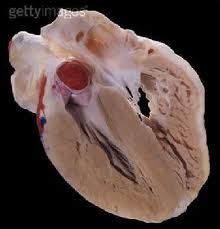据7月6日出版的《新英格兰医学杂志》上发表的ASCEND-HF试验结果,奈西立肽(nesiritide)对急性失代偿性心衰患者30 d死亡率或再住院率均无影响(N. Engl. J. Med. 2011;365:32-43)。

奈西立肽是一种具有血管扩张作用的重组B型利钠肽。独立的小规模研究结果显示,用药3 h内可降低肺毛细血管楔压和缓解呼吸困难。基于上述结果,美国食品药品管理局(FDA)于2001年批准该药用于急性心衰患者。但此后对上述及其他小规模试验结果的Meta分析表明,该药可导致肾功能恶化,并且使患者过早死亡的风险提高近1倍。
应独立专家小组要求,北卡罗来纳州达杜克大学临床研究所的Christopher M. O’Connor博士及其同事完成了一项名为ASCEND-HF的3年大规模国际临床研究,旨在回答有关奈西立肽有效性和安全性方面的疑问。该试验纳入全球398个医学中心的7,141例急性失代偿性心衰患者,受试者在接受利尿剂、吗啡和血管活性药物标准治疗的同时,半数患者接受7 d的奈西立肽静注治疗,另一半患者静注安慰剂。主要终点指标包括患者6 h和24 h自我报告呼吸困难改善情况以及30 d心衰再住院率或全因死亡率。
结果显示,奈西立肽组呼吸困难改善率略高于安慰剂组(44.5% vs. 42.1%,P=0.03),但没达到预设的统计学意义水平;第2项终点指标发生率分别为9.4%和10.1%,也未见显著差异。两组患者自我报告生活质量、心血管疾病再住院率、心血管疾病死亡率、总存活天数及1个月出院率、心衰持续或恶化率,以及1个月全因死亡率均未见显著差异。不论是否存在基线肾功能不全,两组肾功能损伤程度相似,但奈西立肽组出现无症状性(21.4%)或有症状性(7.2%)高血压的患者比例明显高于安慰剂组(分别为12.4%和4.0%)。
基于上述结果,研究者认为不应向急性失代偿性心衰患者广泛推荐奈西立肽。研究者曾在2010年11月美国心脏协会(AHA)科学年会上报告了ASCEND-HF结果。
研究者指出,曾认为由于奈西立肽在缓解呼吸困难和瘀血方面可使患者有较大收益,因此该药在美国获得批准并很快被临床接受,而后来的Meta分析显示其在生存率和肾功能方面具有不良作用,从而导致临床应用率显著下降。而最新研究显示,上述观点均不准确。奈西立肽在开发和评价方面存在根本缺陷,上市之前缺乏主要终点试验研究,患者和医生对该药物的真正临床作用缺乏正确了解。
研究者认为,该试验结果表明,基于少数事件的观察会导致不可靠的收益风险评估,后者进而对数据解释产生干扰,只有设计严谨、高检验效能的试验才能提供可信的评价。该研究也凸显了以可信的评价替代不完整或不充分证据作为治疗决策基础的迫切要求。
加州拉荷亚Scripps转化科学研究所Eric J. Topol博士在随刊述评中指出,花费了整整10年时间才了解到奈西立肽治疗急性心衰无效的事实,而在此期间,仅药费就浪费了10亿多美元。由于FDA没有计划或能力对上市药物进行充分的临床评价,因此“无意之中创造了一个超级怪物”。医生对奈西立肽的有效性和安全性缺乏准确了解,特别是在一些不规范诊所超适应证使用。奈西立肽生产商Scios公司在药物上市后的前几年忙于大力推销,而不愿意花费资源设计和实施具有说服力的临床试验,因此生产商才是真正的罪魁祸首 (N. Engl. J. Med. 2011;365:81-2)。
ASCEND-HF由强生旗下的Scios公司资助。研究者报告与多家药企存在经济利益关系,O’Connor博士曾得到美敦力等多家医药公司的咨询费,两位作者为强生公司职员。Topol博士无利益冲突披露。
生物探索推荐英文原文:
Effect of Nesiritide in Patients with Acute Decompensated Heart Failure
BACKGROUND
Nesiritide is approved in the United States for early relief of dyspnea in patients with acute heart failure. Previous meta-analyses have raised questions regarding renal toxicity and the mortality associated with this agent.
METHODS
We randomly assigned 7141 patients who were hospitalized with acute heart failure to receive either nesiritide or placebo for 24 to 168 hours in addition to standard care. Coprimary end points were the change in dyspnea at 6 and 24 hours, as measured on a 7-point Likert scale, and the composite end point of rehospitalization for heart failure or death within 30 days.
RESULTS
Patients randomly assigned to nesiritide, as compared with those assigned to placebo, more frequently reported markedly or moderately improved dyspnea at 6 hours (44.5% vs. 42.1%, P=0.03) and 24 hours (68.2% vs. 66.1%, P=0.007), but the prespecified level for significance (P≤0.005 for both assessments or P≤0.0025 for either) was not met. The rate of rehospitalization for heart failure or death from any cause within 30 days was 9.4% in the nesiritide group versus 10.1% in the placebo group (absolute difference, −0.7 percentage points; 95% confidence interval [CI], −2.1 to 0.7; P=0.31). There were no significant differences in rates of death from any cause at 30 days (3.6% with nesiritide vs. 4.0% with placebo; absolute difference, −0.4 percentage points; 95% CI, −1.3 to 0.5) or rates of worsening renal function, defined by more than a 25% decrease in the estimated glomerular filtration rate (31.4% vs. 29.5%; odds ratio, 1.09; 95% CI, 0.98 to 1.21; P=0.11).
CONCLUSIONS
Nesiritide was not associated with an increase or a decrease in the rate of death and rehospitalization and had a small, nonsignificant effect on dyspnea when used in combination with other therapies. It was not associated with a worsening of renal function, but it was associated with an increase in rates of hypotension. On the basis of these results, nesiritide cannot be recommended for routine use in the broad population of patients with acute heart failure. (Funded by Scios; ClinicalTrials.gov number, NCT00475852.)
Presented in part at the 2010 scientific sessions of the American Heart Association, Chicago, November 14–17, 2010.
Supported by Scios.







